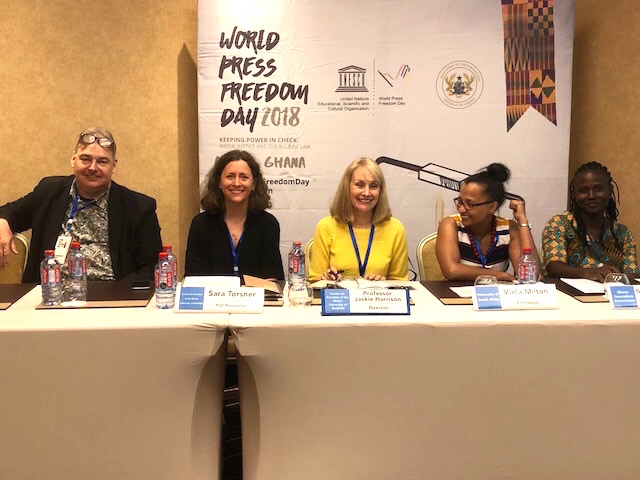At a UNESCO research conference on the safety of journalists during the celebrations of World Press Freedom Day in Helsinki, Finland on 3 and 4 May 2016, UNESCO declared ‘that the Safety of Journalists paved the way for academic research cooperation’. To advance such cooperation the Centre for Freedom of the Media (CFOM), University of Sheffield, UK, supported by UNESCO, has launched a journalism safety research network (JSRN). The network is hosted by CFOM and scholars, media workers and others have been invited to sign up for future academic networking opportunities and to the prospect for greater research communication and collaboration in the area of journalism safety.
So far we have gone ahead with the launch of our facebook group a we have collected members to join. Today we are proud to announce that the network hub is available for use.
This JSRN Network Hub is a closed area for network members that you will all be able to sign into, share documents, create research collaborations and search for other network members with similar research interests. We hope that you will use this space to collaborate on research with the shared aim of increasing the worldwide safety of journalists.
JSRN is part of the molecular structure of the antidote to those who would suppress or restrain free and independent news journalism. Research can address the problems of journalism safety from many different but important perspectives and approaches that help us to build up a clearer and larger picture over time. Such knowledge then can be used to help more researchers and stakeholders to become experts on pressing issues relating to journalism safety and to contribute knowledge to the capacity building processes that are needed to develop effective protection mechanisms in different countries.
To do all of this the JSRN must also combine widespread membership and accurate research with publicity. Combined they are a form of civil intervention. The JSRN may not be the most dramatic form of civil intervention, but other institutions and organisations that attach themselves to the principle of publicity, including such diverse bodies ranging from international tribunals to investigative journalism with many others in between, constantly attest to its effectiveness. Publicity here is understood to be regarded both as a form of evidence that can be readily understood and is easily and widely available for all to see and possibly act upon. Therefore to be effective a network needs to produce accurate research that in turn can be ‘translated’ into a synoptic form that is easily disseminated through the widespread communication of its findings. It is this ‘translation service’ (for example simply explaining how particular pieces of research might measure political fragility and its associated risk to journalism in a specific area, or how certain cultural hostilities originated and how they threaten free and independent journalism in a given international region) that completes the triadic structure of the JSRN: diverse participants, accurate research and publicity. Redressing injustices requires a diversity of knowledgeable opinion, first-hand understanding and research expertise of the kind sustained by a well functioning knowledge network attached to publicising its findings no matter how unpalatable they might be to some.
Find out more here.



